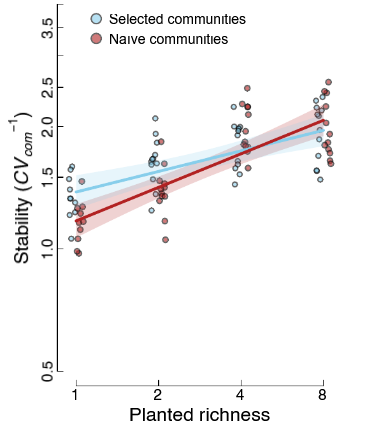New publication from van Moorsel et al. in Ecology: Co‐occurrence history increases ecosystem stability and resilience in experimental plant communities

Understanding factors that maintain ecosystem stability is critical in the face of environmental change. Experiments simulating species loss from grassland have shown that losing biodiversity decreases ecosystem stability. However, as the originally sown experimental communities with reduced biodiversity develop, plant evolutionary processes or the assembly of interacting soil organisms may allow ecosystems to increase stability over time. We explored such effects in a long‐term grassland biodiversity experiment with plant communities with either a history of co‐occurrence (selected communities) or no such history (naïve communities) over a four‐year period in which a major flood disturbance occurred. Comparing communities of identical species composition, we found that selected communities had temporally more stable biomass than naïve communities, especially at low species richness. Furthermore, selected communities showed greater biomass recovery after flooding, resulting in more stable post‐flood productivity. In contrast to a previous study, the positive diversity–stability relationship was maintained after the flooding. Our results were consistent across three soil treatments simulating the presence or absence of co‐selected microbial communities. We suggest that prolonged exposure of plant populations to a particular community context and abiotic site conditions can increase ecosystem temporal stability and resilience due to short‐term evolution. A history of co‐occurrence can in part compensate for species loss, as can high plant diversity in part compensate for the missing opportunity of such adaptive adjustments.

Reference:
van Moorsel, S.J., Hahl, T., Petchey, O.L., Ebeling, A., Eisenhauer, N., Schmid, B. and Wagg, C. (2020), Co‐occurrence history increases ecosystem stability and resilience in experimental plant communities. Ecology. Accepted Author Manuscript. https://doi.org/10.1002/ecy.3205



